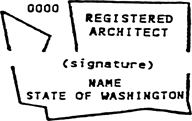Every architect licensed in the state of Washington must have a seal of design authorized by the board, bearing the registrant's name, license number and the legend "Registered architect, state of Washington." An example of the board-authorized seal appears below. Deviations are not allowed.
 |
You must sign and seal all technical submissions required for building permits or regulatory approvals that are filed with authorities having jurisdiction.
(1) Drawings prepared by you must be signed and sealed on each sheet.
(2) Specifications and other technical submissions need only be sealed on the cover, title page, and all pages of the table of contents.
(3) The seal may be electronic.
You may only sign and seal drawings prepared by you, or in one of the following ways:
(a) By your regularly employed subordinates and reviewed by you;
(b) By an individual or firm under direct subcontract with you, if the signing and sealing architect has reviewed and coordinated the preparation of the work, or has integrated the work into their own technical submissions;
(c) In collaboration with an architect licensed in a jurisdiction recognized by the board provided there is a contractual agreement between you and that architect, if the signing and sealing architect has reviewed and coordinated the preparation of the work, or has integrated the work into their own technical submission.
By signing and sealing technical submissions, you become the architect of record and are responsible to the same extent as if you prepared the technical submissions yourself.
Without exception, these stamping requirements apply to all work filed with public authorities you prepare or review, or that is prepared under your personal supervision by persons under your direction and control, regardless whether the work is exempt from the licensing requirements found in RCW 18.08.410.
(4) The term "signature" or "signed" as used in chapters 18.08 RCW and/or 308-12 WAC, means the following:
(a) A handwritten identification or a digital representation of your handwritten identification that represents the act of putting your name on a document to attest to its validity. The handwritten or digital identification must be:
(i) Original and written by hand, or a scanned image of an original, handwritten identification;
(ii) Permanently affixed to the document(s) being certified;
(iii) Applied to the document by the identified licensee or by their designee under the direction of the licensee;
(iv) Placed across the seal/stamp of the licensee.
(b) A digital identification that is an electronic authentication process attached to or logically associated with an electronic document. The digital identification may include a scanned or digitized signature. The digital identification must be:
(i) Unique to the licensee using it;
(ii) Capable of independent verification;
(iii) Under the exclusive control of the licensee using it; and
(iv) Linked to a document in such a manner that a digital identification is invalidated if any data in the document is changed.